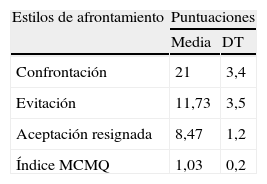Indagar sobre el tipo de afrontamiento que realizan los pacientes con DM tipo 1 que acuden a una consulta de educación de enfermería y analizar si existe relación entre el tipo de afrontamiento (EA) y el control-automanejo de la enfermedad.
MétodoEstudio descriptivo transversal realizado sobre todos los pacientes que acuden a una consulta de educación diabetológica en el Hospital de Ourense. Se recogieron variables sociodemográficas, clínicas y relacionadas con el manejo de la DM. Para la evaluación de los EA se utilizó el Cuestionario Médico de Estrategias de Afrontamiento de Feifel, que diferencia 3 EA: confrontación (C), evitación (E) y/o aceptación resignada (AR), estableciendo un índice total de afrontamiento (IMCMQ). Los datos fueron analizados con el programa SPPS 15.0.
ResultadosParticiparon 51 pacientes. El perfil de paciente es un hombre que lleva 14,56 años (± 11,44) diagnosticado de DM, siendo sus últimas cifras de hemoglobina glicosilada (HbGl) de 7,5% (± 1,04). Las puntuaciones para los EA fueron: C 21 ± 3,4; E 11,73 (± 3,5); AR 8,47 (± 1,02); IMCMQ 1,013 (± 0,23). Encontramos diferencias significativas (p=0,01) entre el IMCMQ y los valores de HbGl.
ConclusionesNuestros pacientes utilizan un EA-C, entendido éste como aquel en el que la persona trata de entender y abordar abiertamente la situación. Es el estilo más eficaz y el de mejor pronóstico. A la luz de los datos obtenidos podemos inferir que nuestros pacientes poseen un EA activo y adecuado hacia la DM y que éste influye positivamente en el control de sus valores de HbGl.
To investigate how patients with DM Type 1 attending a nursing education clinic cope with the disease and to analyse the relationships between the style of coping (CS) and control-self-management of the disease.
MethodA cross sectional study was performed on all patients attending a diabetes education consultation at the Hospital of Ourense. The sociodemographic and clinical variables, as well as those related to the management of DM were collected. The Medical Questionnaire Coping Strategies of Feifel was used to assess the CS using 3 different models: confrontation (C), avoidance (A) and/or resigned acceptance (RA), and a total coping index (IMCMQ) was established. The data were analysed with SPSS 15.0 statistics program.
ResultsA total of 51 patients. The average profile of patient is of a male who had been diagnosed with DM for 14.56 years (±11.44), and with latest HbA1c levels of 7.5% (±1.04). The scores for the CS were: C 21±3.4, A 11.73 (±3.5), RA 8.47 (±1.02); IMCMQ 1.013 (±0.23). As for the relationship between the IMCMQ score and the latest HbA1c values, there were significant differences (P=0.01).
ConclusionsOur patients use the CS-C, understood as one in which a person tries to understand and address the situation openly. This style is the most effective and associated with best prognosis. In light of the data obtained, we can infer that our patients have an active and appropriate CS and it has a positive impact on their HbA1c values.








